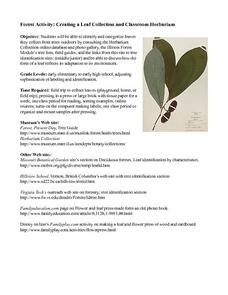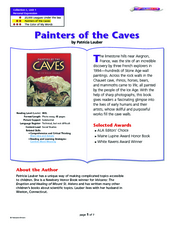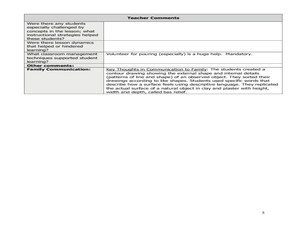Curated OER
Showing Nature's Way-Plant Development and the Plant Parts We Eat
Learners explore plant life. In this science lesson plan, students demonstrate and record the stages of plant growth and categorize food plants by identifying the edible part.
Curated OER
Explore: 1st Grade Plant Observation
First graders grow seeds in a mini terrarium. They compare the root systems, stems, leaves, and flowers of the different plants. They categorize the plants and discuss the basic functions of plant parts.
Curated OER
Star Words
Students identify and categorize apostrophes. They create maps of the solar system and write simple sentences using apostrophes that describe each planet's characteristics.
Curated OER
ESL Pre-Intermediate Vocabulary Worksheet- Seasons
In this ESL pre-intermediate seasons worksheet, students place seasonal words into four lists. They categorize words into spring, summer, autumn/fall, and winter.
Curated OER
Chemistry: Metals and Non-Metals
Students conduct an experiment to test the reactivity of metals and non-metals. In this chemistry lesson students test metals with different chemicals to observe the reaction. The results are used to categorize the metals.
Curated OER
Making a Fossilized Egg
Students explore fossils by participating in an in class experiment. In this archaeology instructional activity, students utilize dough and classroom objects to create fossil imprints after hiding the toy/fossil in the dough egg....
Curated OER
Creating a Leaf Collection and Herbarium
Young scholars gather and identify leaves for a collection. They discuss how a leaf's form reflects its adaptation to its environment. They press the leaves in a book and glue them on construction paper.
Curated OER
Worksheet 14. Which Word Doesn't Belong?
In this word group worksheet, students circle the word in each word group that does not belong. There are 10 questions on this worksheet.
Curated OER
Plant Growth and Environment
Third graders bring to school various green plants and categorize them into plant leaves, stems, roots, and fruits. They answer the question, "How can you show there is starch in a plant?" and perform the iodine test and describe the...
Curated OER
ESOL Transportation and Travel
Students identify required documents related to transportation (driver's license, insurance card, registration, passport). They discuss and categorize the following documents needed for local and or international travel; driver's...
Curated OER
Earth Epochs
Learners explore earth epochs, i.e, Permian, Precambrian, Cambrian, Ordivician and through pictures they see what life on Earth and animals looked like. They organize Earth Epochs according to years going from greatest to least...
Curated OER
Explora-Pond: 1st Grade Shore Count
First graders experience addition through the exploration of a virtual pond. They categorize the various plants around the pond, count the number of various types of plants on the pond shore, and calculate the number of shrubs.
Curated OER
Garbage Can Archaeology
Students explore the use of stratigraphy to date objects by sorting the material in the wastebasket. They make a list of actual items from the garbage can and their possible uses and categorize the artifacts.
T
Curated OER
Five a Day
Students look up and print definitions of fruit and vegatable. They write down their food intake for three days. They identify and categorize fruits and vegetables. They research how fruits and vegetables grow. They bring in their...
Curated OER
ESL: Pronunciation of Common Words-Vowel Sounds
In this ESL pronunciation learning exercise, students categorize a set of words according to their vowel sounds. Sounds are given next to words that use them; words given are sorted beneath each, 14 sounds total.
Curated OER
Painter of the Caves
What a great instructional activity! Learners read a story called Painters of the Caves by Patricia Lauber which discusses Stone Age wall paintings in Avignon, France. There is a series of discussion questions, comprehension questions,...
Curated OER
A Pill with a View
Students brainstorm a list of potential uses for micro-video technologies. After reading an article, they analyze the development of a new pill-sized camera. In groups, they create a children's book that shows them the various systems of...
Curated OER
Language Arts: Ode to the Ordinary
Eighth graders select ordinary objects, determine their uses, and write poems about them. Once they select an object, they create a web about its uses to serve as an outline. Once they have written their own odes, 8th graders meet in...
Curated OER
Plaster Casts of Natural Objects
Fourth graders observe objects in science and create a contour picture of the the object. In this arts and science observation lesson, 4th graders develop a clay sculpture of their object. Students generate a list of texture...
Alabama Wildlife Federation
Wildlife Habitat Checklist
Take a walk on the wild side with a project about animal habitats. After kids observe a chosen animal in its home, they describe the animal's food and water sources, shelter, and how it raises its young. They then write a short fictional...
Rainforest Alliance
Forests of Guatemala
With 90 percent of its land area covered in forests, Suriname, a country in South America, contains the largest percentage of forests throughout the world. Here is an activity that brings classmates together to learn about the...
Curated OER
Fun with Food
Students explore the Spanish equivalents for everyday food items and determine reasonable prices for those items using the currency of Spanish speaking countries.
Curated OER
Shapely Figures
Learners are given magazines, scissors, glue, and one sheet of construction paper. They look for pictures showing real life representations of rectangular prisms, spheres, cones, and pyramids. Pupils cut out pictures showing each of...
Curated OER
Where Growth Meets Growth
Students discuss fire risk factors for a property located near a wildland area. In this science lesson, students identify, number, and provide reasons for areas of increased risk on a worksheet they think should be changed. Students...

























